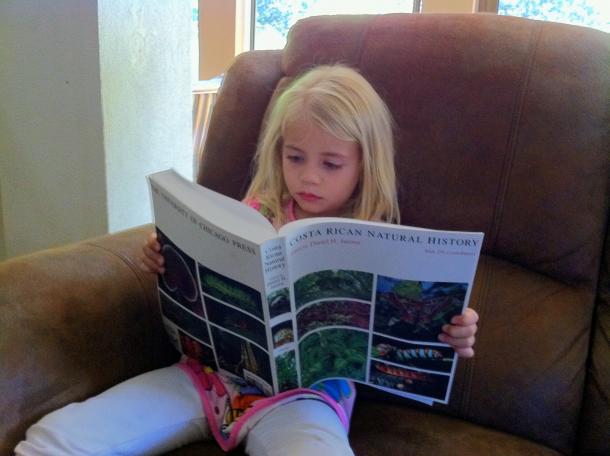
Nina Masís, the daughter of ACG Director Alejandro Masís, reading Costa Rican Natural History in 2011. Photo by Alejandro Masís.
It’s a bit hard to believe, but the seminal book Costa Rican Natural History, edited by Dr. Dan Janzen, is 40 years old this year! First published in 1983, this book was a synthesis of existing knowledge about the flora and fauna of Costa Rica. Dr. Scott Miller, GDFCF Board Member and Senior Biodiversity Advisor, National Museum of Natural History, Smithsonian Institution, calls the book “a foundational compilation of biodiversity knowledge for 40 years” and says it is as if Dan Janzen was “trying to build a website without having the Internet!” Peter H. Raven, the Director of the Missouri Botanical Garden, says the book “is an extraordinary, virtually unique work... The tremendous amount of original, previously unpublished, firsthand information is remarkable.”
And, clearly, as you can see from the photo above, it provides good reading for all ages (if you can hold all 820 pages of it)! The book is available free for download here (in both English and Spanish) and to purchase, here.
When originally published, here is what Dan had to say about it: “Many biologists are now studying natural history in Costa Rica. Many more will do so. This book is an attempt to write down some of what we already know, in a form that can be quickly digested by the newcomer to Costa Rican field biology. I shudder to think that this book might become a definitive statement about Costa Rican natural history. It is neither that nor a thorough review of the literature on the subject. It is, however, an introduction to that literature, and it should give the newcomer a starting point for inquiries into the biology of Costa Rican organisms. I hope this book will be out of date in ten or twenty years; some sections were out of date as they were being written. Those who read it are the ones who will make it obsolete. In editing these various contributions from 174 authors, I have been impressed with how fragmentary is the knowledge each of us has even of our own areas of specialization and of the organisms we are supposed to be familiar with. Rather than be scornful of this sorry state of tropical biology, however, I encourage the reader to work doubly hard to rectify it.”